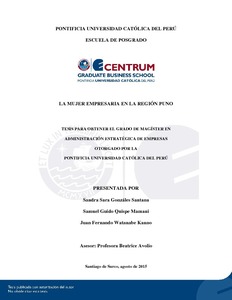| dc.contributor.advisor | Avolio Alecchi, Beatrice Elcira | |
| dc.contributor.author | Gonzáles Santana, Sandra Sara | es_ES |
| dc.contributor.author | Quispe Mamani, Samuel Guido | es_ES |
| dc.contributor.author | Watanabe Kanno, Juan Fernando | es_ES |
| dc.date.accessioned | 2017-06-20T17:54:25Z | |
| dc.date.available | 2017-06-20T17:54:25Z | |
| dc.date.created | 2015 | |
| dc.date.issued | 2017-06-20 | |
| dc.identifier.uri | http://hdl.handle.net/20.500.12404/8851 | |
| dc.description.abstract | La presente investigación es de alcance descriptivo, con un enfoque cualitativo, cuyo
objetivo general es describir la situación actual de la mujer empresaria de la región de Puno y
sus perspectivas a futuro. La metodología utilizada fue la de casos múltiples, entrevistando a
14 mujeres empresarias de esta región, con negocios de distintos rubros, como la ferretería, la
distribución de alimentos o la artesanía. Los datos recopilados se analizaron utilizando el
software Atlas Ti y esta información se combinó con el análisis de fuentes secundarias como
estadísticas poblacionales y sociales suministradas por el INEI o datos económicos de la
región, que se obtuvieron del BCRP. Al caracterizar a las 14 mujeres entrevistadas se conoció
que todas tienen hijos, y 13 de ellas poseen viviendas propias. En cuanto a la operación de
sus negocios, en dos casos no cuentan con empleados y en otros dos tienen ocho empleados,
evidenciando la capacidad de generar empleos, con negocios que en su mayoría tienen más
de 15 años de fundados.
Las conclusiones del estudio revelan que las expectativas se dan tanto en el ámbito
familiar como laboral, siendo la principal lograr que todos sus hijos sean profesionales,
esperando que con esto logren tener condiciones de vida mejores que las de sus padres. A
nivel familiar, también aspiran a disfrutar de más tiempo libre en un futuro, así como en
varios casos desean mejorar las condiciones de su vivienda o continuar estudiando. En el
aspecto laboral, predomina el deseo de hacer crecer su negocio y en algunos casos aspiran a
cambiar de rubro.
El problema está en que enfrentan algunas barreras o limitaciones para alcanzar sus
metas, destacando la falta de capital para hacer crecer sus negocios o poner nuevos, junto con
la capacitación oportuna y en temas puntuales. Adicionalmente se encontró que hay
deficiencias en los servicios de salud, lo cual trae largos tiempos de espera o mala atención y
a esto se le añade la discriminación por género | es_ES |
| dc.description.abstract | The scope of this research is descriptive with a qualitative approach. The main
objective is to describe the current situation of women entrepreneurs in the region of Puno
and its future prospects. The methodology used is interview based. The sample for this study
is 14 women entrepreneurs from the region with diverse business industries such as hardware
retailing, food distribution or crafts. The collected data was analyzed using the Atlas Ti
software. Additionally, this information is combined with secondary sources such as
population and social statistics provided by the INEI, and economic data from the region
which was obtained from Peru’s Central Bank. The characteristics of the 14 women
interviewed are mothers of which 13 of them are home owners. As for the operation of their
business, the range of employees goes from 0 up to 8, demonstrating the ability to generate
jobs in businesses mostly founded 15 years ago.
The conclusions reveal that two goals are present: the personal one related to their
families and the professional one related to their businesses. The main personal objective
focuses on their children becoming professionals, hence achieving better living conditions
than their parents. Another personal aim is to have more free time in the future and, in several
cases, to improve their housing conditions or to continue studying. In the professional
ground, the predominant desire is to grow their business or to change industry.
There are some barriers or limitations for the women in Puno in order to achieve their
targets. The most relevant ones are the lack of capital to grow their business or start new ones
and a timely training on specific topics. Other limitations such as poor healthcare and gender
inequality bring more obstacles to accomplish their goals | es_ES |
| dc.language.iso | spa | es_ES |
| dc.publisher | Pontificia Universidad Católica del Perú | es_ES |
| dc.rights | info:eu-repo/semantics/openAccess | es_ES |
| dc.rights.uri | http://creativecommons.org/licenses/by-nc-nd/2.5/pe/ | * |
| dc.subject | Mujeres en los negocios -- Perú -- Puno | es_ES |
| dc.subject | Emprendimiento (Administración) | es_ES |
| dc.subject | Investigación cualitativa | es_ES |
| dc.title | La mujer empresaria en la Región Puno | es_ES |
| dc.type | info:eu-repo/semantics/masterThesis | es_ES |
| thesis.degree.name | Maestro en Administración Estratégica de Empresas | es_ES |
| thesis.degree.level | Maestría | es_ES |
| thesis.degree.grantor | Pontificia Universidad Católica del Perú. CENTRUM | es_ES |
| thesis.degree.discipline | Administración Estratégica de Empresas | es_ES |
| renati.discipline | 413307 | es_ES |
| renati.level | https://purl.org/pe-repo/renati/level#maestro | es_ES |
| renati.type | https://purl.org/pe-repo/renati/type#tesis | es_ES |
| dc.publisher.country | PE | es_ES |
| dc.subject.ocde | https://purl.org/pe-repo/ocde/ford#5.02.04 | es_ES |






